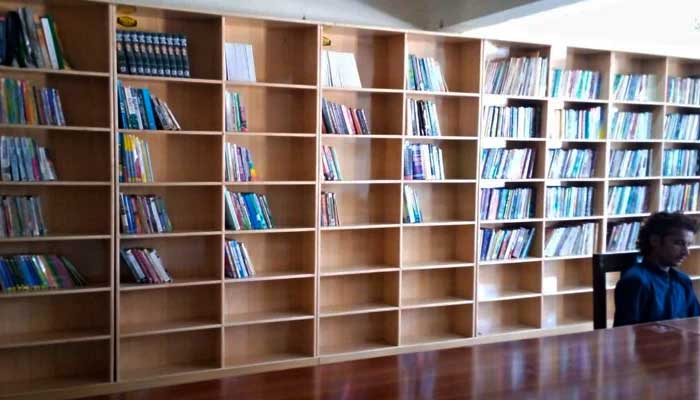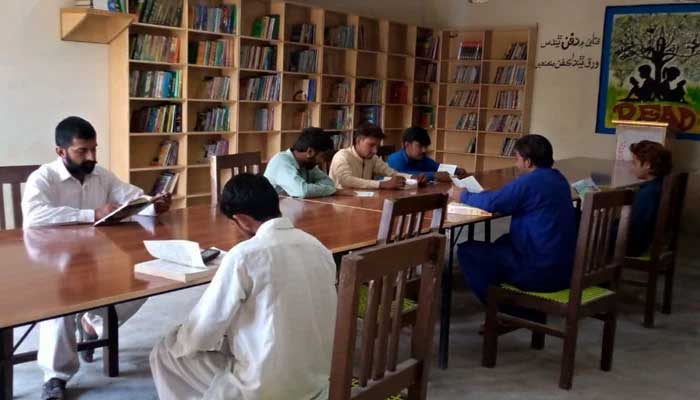‘Where there’s a will, there’s a way’: Small town students take charge to revive reading culture in Pakistan
Students from Khairpur and Wadh have taken it upon themselves too counter the notion that small town folk are not interested in books
“Access to public libraries should be viewed as a necessity and not a luxury in Pakistan”, 20-year-old social activist Jehangir Shams says, while lamenting what he believes is a fast declining culture of reading in the country.
Shams, a resident of Karoondi town in Sindh’s Khairpur district, says the culture of reading in most underdeveloped areas of the country is “bleak and forsaken since ages”. He blames the lack of attention given to public spaces that can encourage the habit.
Shams, together with other students in Khairpur — as well as some from Balochistan — has also recently come to realise that there is a general misconception that students in lesser developed areas of the country are not interested in books to begin with.
To counter this notion, and to inculcate a love for reading among townspeople, the enterprising pupils have launched library projects in their respective towns.
'Reading for all'
“Most students in my town look for a decent, quiet place to prepare for their competitive examinations for jobs and for admission tests to different universities. Our aim, however, is to promote the idea that access to public libraries is a right for all (not just students),” Shams told The News.
Shams is currently pursuing a degree in legislative law from Shaheed Zulfiqar Ali Bhutto University for Law (SZABUL) in Karachi. He is also the chairman for a campaign called Nojawan Ittihad Karoondi, run by his friends with a handful of funds, mostly donated by feudals and fellow students of his native town. The campaign works for the welfare of the people of Karoondi.
“We believe that this library will produce hundreds of brilliant minds which will definitely serve the country in the long-run. Just as access to basic necessities like food, shelter, and education is everybody’s right, access to libraries and quality books should not be limited to a specific class or culture,” he said.
Speaking of his initiative’s fund-raising targets for the coming year, the young activist said that the library now needs donations for more books, water dispensers, a notice board, wall clock, and computer systems for research.
The library can accommodate 35-40 students at a time, Shams said, adding that the project also plans on expanding the space with more donations and support in the near future.
‘Where there’s a will, there’s a way’
Speaking of how the establishment of the library was made possible, he said that the land was gifted by Senior Advocate of Sindh High Court Haji Shamsuddin Rajper, who also donated around Rs 200,000.
"Rs300,000 for the remaining expenses were generated through fundraising campaigns led by the students of Karoondi,” Shams said.
The library is presently running on monthly donations from the citizens of Karoondi, the activist added.
He said that presently, all students who visit the library, have free access to internet services, audiovisual facilities, photocopying and printing, and can borrow books. Moreover, they also participate in workshops and seminars conducted under the project.
“We have come so far with the help of generous donations from our elders and most students, however, to accomplish our future targets, we do look forward to support from students who can send us books from around the country,” the young activist said.
Reflecting on the challenges faced by the project in its early days, Shams said: "We had nothing but a vision to revive the culture of reading in our small town. But, as they say: ‘Where there's a will there's a way'. Here we stand now, with one library successfully running in Karoondi, and another planned in Pacca Chang city in the coming days."
Donations from across Pakistan
Another student, Sheikh Siraj, who helped establish the Wadh Students Library in Balochistan, also stressed on the need for reading books, saying he has viewed a "steep decline" in the trend.
"People are losing interest in books. An increasingly digital world with its abundance of information on one's fingertips is slowly wiping out a 'books culture'," Siraj said, adding: "We thought of setting up this library in a bid to revive the lost glory of reading in our community."
Siraj said that the Wadh Students Library has about 2,000 titles spanning several genres, including books for competitive exams, computer sciences, philosophy, psychology, and history, to name a few.
The majority of the people who visit the library are students — aged 18-25 — as university, college, and high-school campuses are situated nearby.
"The daily footfall is over 30," he said, adding that for now, the readers are not allowed to take the books home. The ambiance is appealing enough to spend time sitting there and reading peacefully, he explained.
"Some students even come here to prepare for their semester finals and other exams as we have quite a soothing environment for readers here," he said.
Siraj said that the cause has been receiving donations from all over the country, and presently, at least 600 books in Islamabad await being transported to the library.
"People can contact us on our Facebook page 'Wadh Students Library' to donate to our cause," he said.
Government officials, including the Khuzdar deputy commissioner, Frontier Corps, and other charitable souls helped us in establishing the library, Siraj said, stressing that his project is "not affiliated with any non-government organisation or political party".
"We have a team of nearly 40 students who have volunteered for this initiative," he said, emphasising that they want to see their cause growing with more donations and participation from students.
-
Security forces gun down 30 terrorists in multiple IBOs in KP: ISPR
-
MQM-P calls for new province in Sindh
-
US report validates Pakistan military edge over India: PM
-
Banned TTP poses serious threat to Pakistan security: UNSC panel
-
CM Afridi clarifies remarks on by-poll after ECP requests army deployment
-
Dubai sees 3.2m Pakistani passengers in 2025 as airport sets new milestone
-
Security forces kill 23 Indian proxy terrorists in KP's Kurram
-
Pakistan to construct island to boost oil exploration: report













